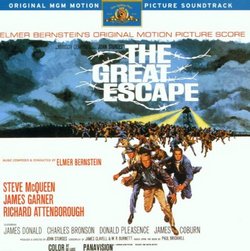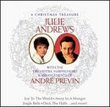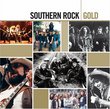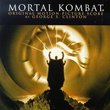| All Artists: Elmer Bernstein Title: The Great Escape: Original MGM Motion Picture Soundtrack Members Wishing: 2 Total Copies: 0 Label: Rykodisc Original Release Date: 7/4/1963 Re-Release Date: 2/24/1998 Album Type: Soundtrack Genres: Pop, Soundtracks Style: Easy Listening Number of Discs: 1 SwapaCD Credits: 1 UPC: 014431071126 |
Search - Elmer Bernstein :: The Great Escape: Original MGM Motion Picture Soundtrack
 | Elmer Bernstein The Great Escape: Original MGM Motion Picture Soundtrack Genres: Pop, Soundtracks
|
Larger Image |
CD DetailsSimilar CDsSimilarly Requested CDs
|
CD ReviewsWhere Was This Film On The AFI List? Michael K. Beusch | San Mateo, California United States | 04/28/2000 (5 out of 5 stars) "The Great Escape certainly didn't get its due when it was released -- it wasn't even nominated for Best Picture, Director or any of the Acting awards. In fact, it was only nominated for Film Editing! It seems, however, that the film doesn't even get its proper due today as it was not on the American Film Institute's 100 Greatest Film list despite its large following.The Great Escape is certainly one of the most memorable films I've ever seen. The cast includes the late great Steve McQueen, James Garner, Richard Attenborough (Director of Gandhi), Charles Bronson, James Coburn, James Donald (Bridge on the River Kwai), Donald Pleasance and David McCallum (The Man From U.N.C.L.E.). McQueen's performance is riveting and makes the viewer miss him all the more. Garner, who actually was a "Scrounger" during the Korean War, is terrific. It's also particularly nice to see a performance as a good guy from Pleasance and as a human being by Bronson (sorry, but Bronson truly wasted his talent in the Death Wish movies). And in an era when studios tried to substitute backlot sets for on location filming, the POW camp, which was built on location in Germany, looks completely authentic and makes the audience sympathize with the prisoners' plight even more. The DVD heightens the experience by presenting the film letterboxed in clear, vibrant colors. In addition, the DVD edition includes a documentary on both the real story and the making of the film. This film is a classic and the DVD edition does it great justice and makes you realize what a mistake the AFI made by excluding it from its list.Here's to "the fifty."" Rip Roaring Entertainment That Holds The Test Of Time Michael K. Beusch | 01/11/1999 (5 out of 5 stars) "I saw The Great Escape in the fall of 1963 when I was 8 years old. In my hometown during those days moviegoing was a family affair-- wear nice slacks and shirt etc. Seeing this grand movie with the macho stars on a big screen with booming sound made quite an impression on me. Steve McQueen was simply the "King Of Cool" and he became my favorite film star. This movie has transcended generations -- my 18 year old son recently viewed it and he was totally engrossed in this fantastic true story of men seeking freedom under the most desperate circumstances. He agreed with me that "they don't make em like they used to" and that most of the films today can't hold a candle to The Great Escape.The DVD is superb -- the color and picture quality is first rate -- looks just like when I saw it in the fall of 1963 at the old Capitol Theatre in Rome, NY. The featurette on the making of The Great Escape is a nice feature that I never saw before." This is The Great Escape Edition to Own M | Lighthouse Pt, FL United States | 10/22/2006 (5 out of 5 stars) "I have rented this film several times. Unfortunately the rental companies such as Netflix don't always have this great latest edition. There will never be another film such as The Great Escape. It would be a mistake to even try. Actually shot in Germany with an international cast. A cast of stars such as never have been seen in one motion picture. Especially of interest to me was the extras. Many of the cast members have passed away since this edition was put out That there words are on this DVD is a much appreciated plus..
Almost as interesting as the film is the commentary and exras. Being a long time fan of David MCCallum (now on CBS network NCIS), I was especially interested in his comments. Absolutely fascinating. Maybe the motor cycle scene was put in for entertainment purposes. Wasn't it a great moment! Did you know Steve McQueen played his own part and several of the Nazi's on motorcycles. Finally the Great Escape is based on a true story. This will tell you the reality from the fiction. This is the edition to buy! They shouldn't remake it. They couldn't possibly make one as great as this! " |

 Track Listings (16) - Disc #1
Track Listings (16) - Disc #1

![I Will Go With You (Con Te Partiro) (Remixes) [Maxi Single]](https://nationalbookswap.com/cd//m/03/0703/440703.jpg)




